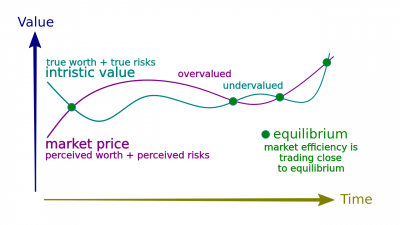Difference between revisions of "Market"
| Line 14: | Line 14: | ||
==Related lectures== | ==Related lectures== | ||
| − | *[[Market | + | *[[Market Intercourses Quarter]]. |
[[Category:Marketing Management]][[Category: Septem Artes Administrativi]][[Category: Economics]][[Category: Articles]] | [[Category:Marketing Management]][[Category: Septem Artes Administrativi]][[Category: Economics]][[Category: Articles]] | ||
Latest revision as of 03:36, 14 June 2023
Market is any space where marketers and consumers are able to engage in willful exchanges or transactions of their market exchangeables. The marketers represent potential sellers; while consumers represent potential buyers. "Willfulness" of exchanges assume buyer choice, which is a situation where buyers have a choice of the sources that may satisfy their needs.
The market allows for interactions between the parties; agreed exchanges and transactions may occur on the same market or outside of it.
- Buyer's market is an aggregate of all market exchangeables that this buyer can possibly buy;
- Seller's market is an aggregate of all buyers who are willing to buy a particular market exchangeable that this seller sells.
Market can also be defined as some space, virtual or physical, in which sellers (a) search for buyers and buyers search for sellers, (b) negotiate prices, and (c) make deals. Market competitiveness refers to the ratio of buyers and sellers of a particular market exchangeable.
Definitions
According to Principles of Economics by Timothy Taylor (3rd edition),
- Market. An institution that brings together buyers and sellers of goods or services.
According to Marketing Management by Keller and Kotler (15th edition),
- Market. Various groups of customers.
